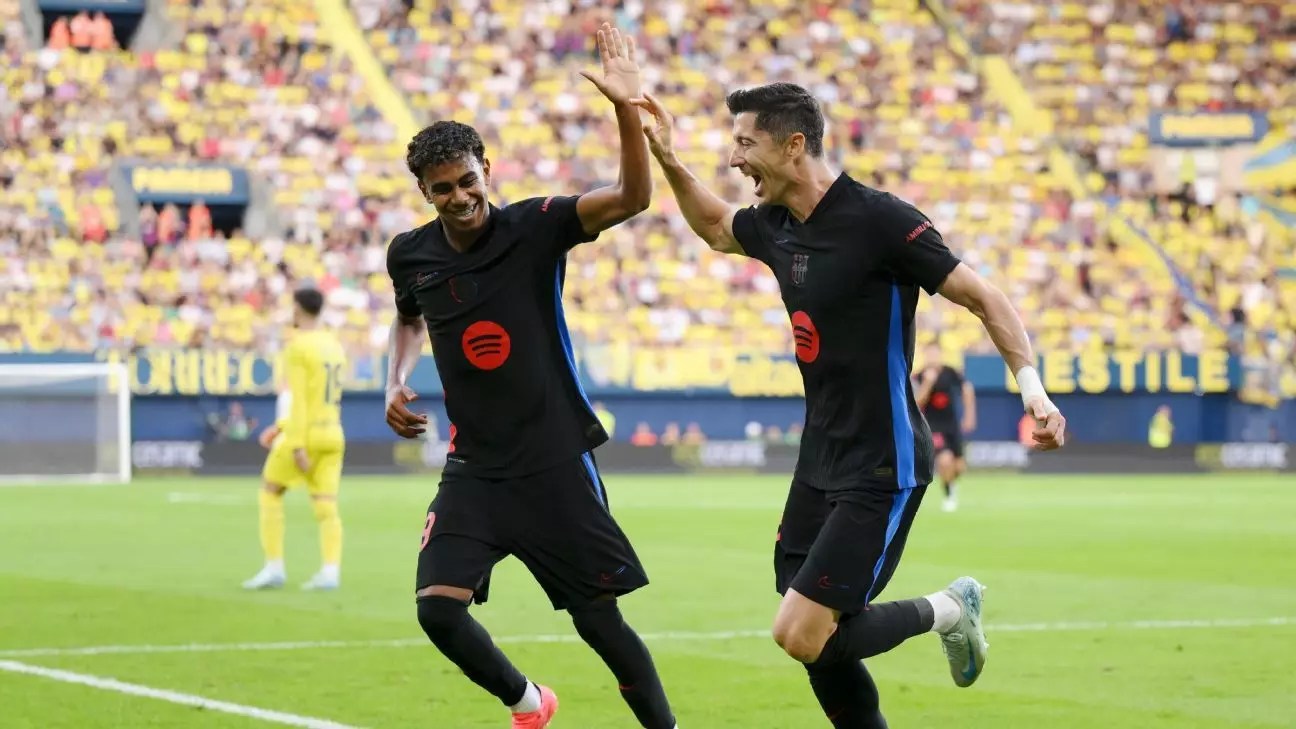In the realm of football, the emergence of young talent can often be a double-edged sword. This is particularly true for Barcelona’s 17-year-old winger, Lamine Yamal, who has taken the football world by storm since the beginning of the season. After a triumphant summer with Spain’s European Championship squad, Yamal has showcased remarkable skills on the pitch, including scoring four goals and providing five assists across his first seven matches. The excitement surrounding his performance is palpable, prompting discussions not only about his immediate impact but also about how best to manage his burgeoning career. Given the physical demands of top-flight football, it is essential to be mindful of how such young athletes are managed, even amidst their dazzling performances.
Barcelona’s head coach, Hansi Flick, has publicly supported Yamal’s current workload, asserting that the winger is not in need of rest at this moment. In a press conference ahead of a critical league match against Getafe, Flick expressed confidence in Yamal’s stamina and mental readiness, emphasizing that they monitor data on player fatigue closely. His sentiment speaks volumes about the challenges coaches face in balancing the pressures of winning games and ensuring the long-term health of young athletes.
Despite Yamal’s youth, Flick’s assertion that his performance is “unbelievable” suggests a recognition that raw talent can sometimes defy conventional metrics of fatigue. Still, as influential as Flick’s words may be, the realities of a physically demanding season cannot be disregarded. As Yamal continues to shine brightly for Barcelona, it will be crucial for the coaching staff to remain vigilant regarding his workload and make decisions that safeguard his future.
One of the more pressing concerns surrounding young players like Yamal is the physical treatment they receive from opposing teams. With increased attention comes heightened aggression, and Flick highlighted the need for referees to protect such prodigious talents. As Yamal’s star rises, so too does the likelihood of him becoming a target for fouls, which could jeopardize both his physical well-being and his ability to perform effectively.
Flick’s trust in referees to manage these situations properly underscores an important aspect of professional football: the protection of players. However, it raises questions regarding whether current measures are sufficient. While referees may act decisively with yellow cards, there remains a grey area in consistently applying these protections, particularly when match officials may tolerate rough play to maintain the flow of the game. A proactive approach by clubs and governing bodies alike may be necessary to ensure that young talents are protected from undue harm.
In addition to Yamal’s individual situation, Barcelona is grappling with a broader conundrum related to squad depth. The recent injury of first-choice goalkeeper Marc-André ter Stegen has pushed the club into a precarious position, leaving them to rely on reserve goalkeeper Iñaki Peña as they explore potential signings in the transfer market. This dilemma exemplifies the necessity of a robust backup plan within a team.
Given the lengthy injury list that includes several key players, the issue of depth is becoming increasingly significant for Barcelona. This situation underlines the importance of strategic foresight in squad management, particularly as they navigate a demanding campaign. As Flick prepares his side for upcoming challenges, his confidence in Peña speaks to the need for supporting players who may not often be in the spotlight but will be pivotal in moments of crisis.
As Barcelona continues to build on their perfect start to the season, the interplay of nurturing young talent like Lamine Yamal while maintaining squad stability is paramount. The club’s ability to manage Yamal’s development, assure his protection on the pitch, and adapt to the challenges posed by injuries will ultimately define their trajectory this season. The path forward involves not only leveraging the brilliance of emerging stars but also fostering a sustained environment where both new and experienced players can thrive under the pressures of elite football. As they strive for success, the lessons learned during this challenging period will resonate for years to come.


Leave a Reply